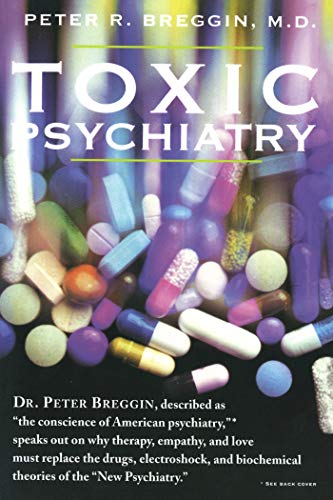Toxic Psychiatry
Why Therapy, Empathy and Love Must Replace the Drugs, Electroshock, and Biochemical Theories of the "New Psychiatry"
Peter R. Breggin M.D.
BOOK REVIEW

In a world drowning in the quicksand of prescription medications and electroshock therapies, Toxic Psychiatry stands as a clarion call to reclaim the sanctity of the human mind. Peter R. Breggin M.D. delivers a relentless expose of the psychiatric establishment, challenging the very foundations upon which modern psychiatric practices stand. This groundbreaking work delves deep into the underbelly of mental health care, puncturing the facade of so-called scientific advancements that often serve as little more than crutches for an industry blinded by profit rather than compassion.
Set against the backdrop of the 1990s-a time when the medical community fervently embraced biochemical theories-it becomes abundantly clear that Breggin is not merely critiquing; he is igniting a revolution. He argues passionately for the forgotten virtues of therapy, empathy, and love, pushing the reader to reconsider the very essence of human connection amidst an age obsessed with pharmacological solutions. Breggin's prose dances between the emotional and the analytical, urging you to confront the dark reality of a system that too often prioritizes pills over people.
As you dive into this intense critique, you'll find an author who is not only a psychiatrist himself but also a fierce advocate for change. Breggin's wealth of personal and professional experience unravels before you, revealing a man deeply affected by the failures of the system he once served. His discussions on the adverse effects of psychiatric medications-ranging from dependency to devastating emotional numbness-challenge you to reflect on your own beliefs about mental health. The emotional weight of his words will resonate within you, perhaps awakening long-buried doubts about the ease with which we accept pharmaceutical solutions to complex emotional issues.
Critics of Breggin might brand him as alarmist or even overly simplistic in his dismissals of biochemical approaches, arguing that he romanticizes the therapeutic process without offering sufficient empirical evidence. However, it's essential to punctuate that Breggin's intentions are profoundly altruistic. He is driven by a fierce compassion for those who suffer-a compassion that often feels absent in clinical settings where patients are treated as mere data points. His thesis is not about discrediting psychiatry as a whole but rather advocating for a more humane, person-centered approach that values relationships as integral to healing.
The echoes of Toxic Psychiatry resonate far beyond its pages; they ripple through contemporary discussions on mental health. The critique of the over-medicalization of mental health issues remains incredibly relevant today, as society grapples with rising rates of mental illness against a backdrop of increasing pharmaceutical use. Breggin's challenge feels potent: to move beyond the confines of what is accepted as healing and to embrace more holistic, empathetic modalities.
Readers of Breggin's work have expressed a spectrum of reactions, from profound agreement to staunch disagreement. Some praise his emotional depth and call for compassion, while others argue that his views dismiss the complexities of mental health that can require medical intervention. Is it possible to integrate Breggin's heartfelt call for empathy with the evidence-backed practices of modern medicine? This is where the debate lies, a tension many will feel acutely as they reflect on their own experiences with mental health.
What emerges from Toxic Psychiatry is not just a manifesto against outdated practices, but a vision for a future where empathy reigns supreme. The methods discussed are not just treatments but pathways leading to understanding, hope, and genuine human connection. Have we allowed the machines of psychiatry to outpace our capacity for emotional intimacy?
Breggin's work is a tapestry woven with urgency, compassion, and raw honesty. It demands that we redefine our relationship with mental health, not just as passive consumers of treatment but as active participants in our own healing. This book not only engages your intellect-it's designed to tug at your heartstrings and propel you into action.
The call to arms is clear: dismantle the stigma surrounding mental health, embrace the vulnerability of relationships, and make space for the radical notion that love and understanding can indeed heal. After exploring Toxic Psychiatry, you might find yourself forever transformed, equipped with a renewed perspective and a mission to advocate for a psychiatric landscape that honors the human spirit over biochemical theories. 📖✨️
📖 Toxic Psychiatry: Why Therapy, Empathy and Love Must Replace the Drugs, Electroshock, and Biochemical Theories of the "New Psychiatry"
✍ by Peter R. Breggin M.D.
🧾 480 pages
1994
#toxic #psychiatry #therapy #empathy #love #must #replace #drugs #electroshock #biochemical #theories #new #psychiatry #peter #breggin #md #PeterRBregginMD